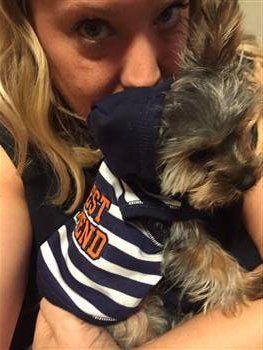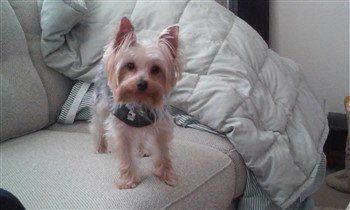How to Help a Shy, Timid Yorkshire Terrier
Overview
While some Yorkshire Terriers will walk up to anyone as if they don’t have a care in the world, there are also lots of dogs that more reserved. A shy dog may feel comfortable only around his immediate family members and yet others are even very cautious with their owners.
Dogs do have varying ranges of emotions, they cannot be alert and super friendly all of the time. However, if you have a Yorkie with an extreme shyness problem this can interfere with everyday activities and impede your puppy or dog’s overall happiness.
In this section, we will discuss:
- Symptoms of shyness
- Why are some dogs timid?
- Can a Yorkie overcome shyness?
- Steps you can take to bring your Yorkie out of his shell
Please note:
YorkieInfoCenter is reader-supported, and some of the product suggestions on this page are affiliate links. As an Amazon Associate we earn from qualifying purchases. This is at no extra cost to you and helps us continue providing free, high-quality information.
Signs that a Yorkie is Overly Shy
Roxy (2 years old) and Teddy (1 and 1/2 years old) Photo courtesy of Sumara Torres
There are lots of owners who aren’t really sure if their dog is truly shy.
He may become quiet when visitors come over. Or he may lie down and opt to not play with other dogs or with children. He may cling a bit closer to his human when outside. Or maybe he makes motions that he wants to be held in a big crowd.
So, the question is, what exactly defines shyness in a dog?
It must be noted that acting overly timid can be very close to anxiety; if a dog is wary of something yet is exposed to it too quickly or without opportunity to retreat, his shyness can turn into outright fear.
For simple shyness, this can range from moderate to severe. Signs include:
- Becoming clingy.
The dog may beg to be lifted up or cuddled. If he is not, he may wrap himself close to his human’s foot.
- Hiding.
The dog may dark to hide in a closet or other ‘safe’ area, even if his chosen spot does not make sense to his owners. For example, the Yorkie may run under the steps when his cozy dog bed was easier to reach.
- Becoming quiet. A vocal dog may quiet right now and this often goes hand in hand with the first two symptoms.
And then, if shyness is intermingled with anxiety, signs can also include:
- Shaking – The dog may tremble and shiver, even if being held.
- Whining – Most often, dogs that are only shy do not cry or whine. When a dog is being vocal in this way, it is often due to expressing fear and distress.
- Panting – If put into a perceives high-stress environment, the dog may start breathing heavy.
- Pacing – Dogs do this to release tension.
Other signs
Yorkshire Terriers that are really struggling to adapt to their environment and for those that are without help for their shy, timid behavior may start to become depressed. This, in turn, can cause the dog to have a decreased appetite. It should be noted, however, that decreased appetite is also a common sign of a health issue, so you will want to have any potential illness or injuries ruled out.
Why Some Yorkshire Terriers Are Shy
Some dogs are naturally shy and with others, it can develop due to a number of reasons. Let’s look at some important elements:
1)
Puppies are not born with their full range of emotions. One of the emotions proven to exist within canines, suspicion/shyness, develops by the 6-month mark.
For this reason, a Yorkie that was outgoing and super friendly as a young puppy may mature into a shy dog, once he is more aware. Typically, a young Yorkie pup will allow anyone to hold and handle him. He will appear fearless. And he’ll be super curious about his world without hesitation. And then, as he matures and reaches the 4, 5 and 6-month mark, there can be a dramatic change. He now begins to fear the unknown. And his shyness can kick in.
2)
Owners may not know that their Yorkie is shy towards any certain element (situation, event, person), simply because the opportunity to see their dog interact had not happened yet. A Yorkshire Terrier may be a rambunctious, happy-go-lucky dog at home. And then, when faced with something that is new, may not be sure how to react. In these cases, there will be altered behavior; the dog may become fearful, nervous, agitated or shy.
3)
A negative experience can cause a dog to become shy. For example, meeting an aggressive dog may trigger a Yorkie to be fearful with all dogs from that point. Or too rough of play with a child can cause a Yorkie to cower when any children are in the vicinity. For dogs that have exceedingly bad experiences (abuse, neglect) even just a certain sound or smell can trigger the dog to become wary.
Can a Yorkie Really Overcome His Shyness? And Should Owners Even Try to Change Things?
The answer, of course, is not a simple yes or no.
Canines are quite amazing creatures. They are as
intelligent as 2 to 3-year-old humans. Adult dogs, on average, understand 165 words. They are proven to feel emotions ranging from disgust to joy to love.
So, as you can imagine, each dog is going to be completely unique in his personality.
Though the Yorkshire Terrier breed is said to be friendly, alert and inquisitive, this speaks in general terms. It is perfectly normal for a Yorkie to be a bit shy in regard to some things.
And we really must remember that the size of this breed
does play a factor. Being one of the smallest toy breeds in the world, a Yorkshire Terrier
can be aware of his size in compared to all that is around him.
With much of his interactions being with creatures that are larger than him and with being so close to the ground during busy events, his physical perception can cause him to feel intimidated.
Georgie, at 7 months old
Photo courtesy of Jamie
For minor to moderate cases, this can be overcome. In severe cases, lots of work most often can bring the dog to a place of feeling content; but he will most likely never be an exceedingly outgoing dog.
Where you want to make the change is if a Yorkie’s shy behavior is impeding his happiness.
And do remember to look at this from your dog’s point of view and not just what you may expect the 'perfect' pet to be.
That said, with most dogs, happiness and confidence go hand-in-hand. Shyness, particularly if nervousness or anxiety is there, is an obstacle that can get in the way of enjoying life.
How to Help a Yorkie Overcome Shyness
Whether you have a new puppy, are planning on
adopting a rescue or have an adult that needs to gain some confidence, all of these guidelines apply.
1) Never assume that an outgoing young puppy is ‘all set’.
As he becomes more aware of his world, he may retreat into shyness, so you will want to socialize him as much as possible to prevent that from happening.
2) Assess the home.
Before working on any problems, and particularly for shyness, which involves trying to bring the Yorkie to a better emotional state, it is vital to be sure the home environment is conducive to taking steps in the right direction.
Such things as a loud TV near-constantly on, blaring music, arguing & bickering among humans, and too much foot traffic near the dog’s bed and/or eating area can cause a dog to retreat.
And many people do not realize that their household is chaotic. After a while, you can get used to such things and not realize how it is affecting your pets. It may help to ask a few close friends and family members if they consider your home to be relaxed and friendly. If not, ask for specific constructive criticism so that this can be addressed.
3) As you work with your Yorkshire Terrier to combat shyness, your tone of voice and mannerisms are important.
Dogs take both verbal and physical cues from their owners. It is counterproductive to use a soothing voice, as this reinforces that the pup is ‘correct’ in being shy.
Instead, speak in a kind, even, matter-of-fact voice and keep your body language relaxed. Some owners tense up when a situation presents itself in which they expect their dog to be afraid, so do try to show calm confidence.
4) Step-by-step training is key.
Like all elements linked to socialization, gradual exposure is needed.
A dog never does well going from zero to one hundred. Whether you have a puppy
that needs to get used to a slew of things or an adult that needs to become accustomed to a trigger, do this in small, incremental steps.
Charlie, photo courtesy of Wanda
5) To prevent a dog from developing shyness or to allow a dog to overcome it, you will want to expose him to as many elements as possible, but in a gradual way.
There are 3 main areas: People (of all ages, both in and outside the home), places (parks, walking routes, stores, the homes of friends and family) and events (meeting other dogs, being in a crowd, being groomed, etc.).
Remember that your Yorkie’s world is as small or as large as you want it to be; and for a dog to be confident, you’ll want that world to be as big as possible.
6) Choose 1 or 2 elements to work on each day.
You’ll want to use a desensitization method, in which the dog is exposed to an element for a very short amount of time, usually about 5 minutes for the first 5 sessions. Then, for each session going forward, you increase the time by 5 minutes until you reach the goal of 20, unless his learned enthusiasm causes him to want to remain longer.
7) Make each session a success.
Never reprimand and never force interaction. The goal is to present the opportunity, and then allow the Yorkie to find the confidence to overcome his shyness.
This will be done by never scolding, never adding stress by pressuring him and keeping sessions short so that he can slowly become accustomed. Any negative behavior will be ignored and you will remain speaking in a matter-of-fact tone.
Any time there is any improvement (the Yorkie comes out from under the table, shows some curiosity towards a child, allows you to handle or brush
him without, ventures toward another friendly dog, etc.) reward this with happy praise and an immediate treat to mark the exact moment of the behavior.
8) Command training plays a role in helping a dog develop self-confidence.
As a dog masters commands, he feels proud of himself, the rewards & praise give him a boost and he can learn to enjoy showing off his skills.
9) Know your Yorkie’s limits.
As time goes by and your Yorkie is learning to become more comfortable… the treats and praise are giving him confidence…and he is being exposed to more and more stimuli… do not assume that he’ll do great for an unlimited duration.
Every dog has his limits. Yorkies should always have their own area to retreat to when they need a break and many previously shy dogs simply cannot handle an entire day of interactions.
Did you find this article helpful?
If so, you may find a book with a complete Socialization Chapter to be very helpful. Where can you find this?
In the Yorkshire Terrier-specific, 296 page YorkieInfoCenter book, available in both print and eBook formats.
Things to Do Now:
Become a Member
(if you are not already a Member) - Joining the YorkieInfoCenter family is free & easy! Receive reminders when we add a new page and suggest a topic for us to write about. You will also receive a free & helpful Welcome Booklet.
Check out our book
- Simply the most comprehensive, helpful Yorkshire Terrier book that exists. Now in both print & eBook!





